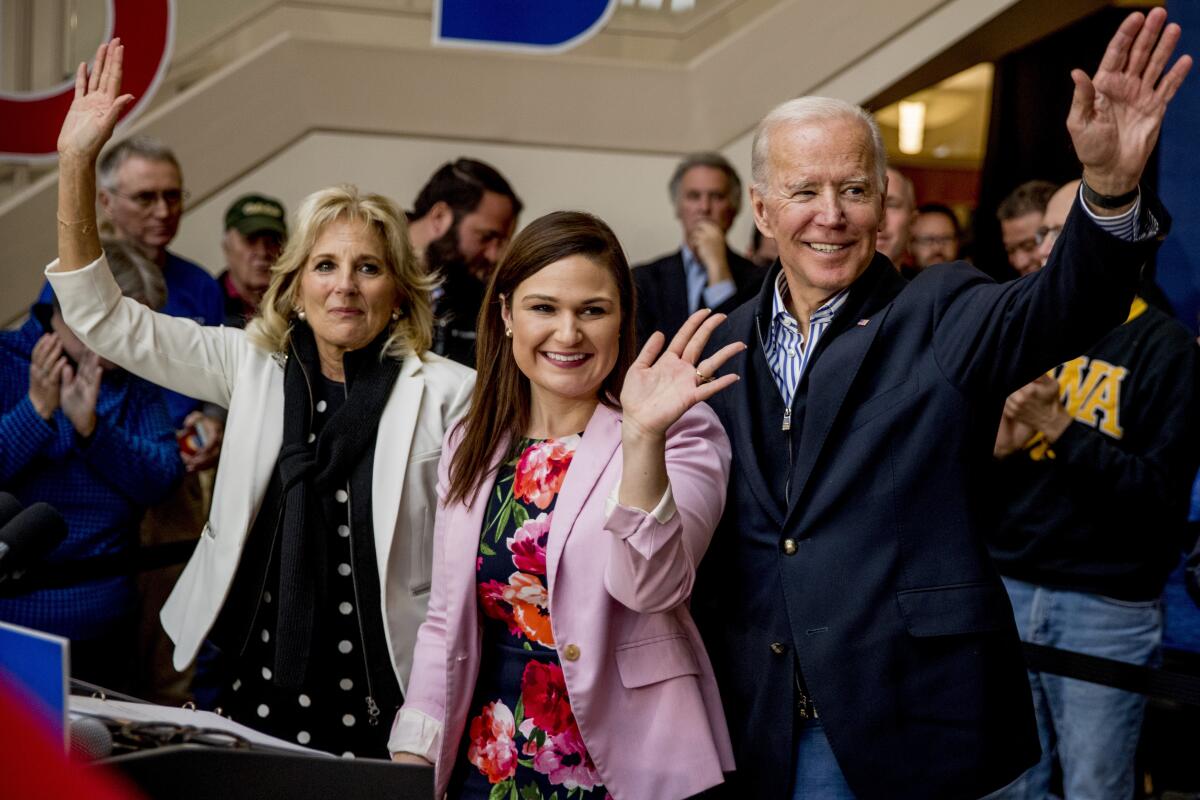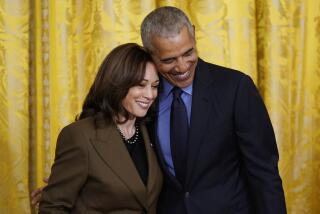Joe Biden is winning Democrats’ ‘endorsements primary.’ Does it matter these days?

- Share via
WASHINGTON — When Joe Biden’s campaign announced an Alabama Democrat’s endorsement last month, it seemed ho-hum: Yet another elected official throwing his weight behind the 2020 presidential candidate most closely associated with the party establishment.
Yet this one was different: Mayor Randall Woodfin of Birmingham is no old-school party regular, but a young, black progressive elected as an insurgent in 2017 with support from Sen. Bernie Sanders of Vermont — now Biden’s 2020 rival — and his organization, Our Revolution. Woodfin’s endorsement of Biden not only turned heads, but also reinforced Biden’s argument that he is the candidate best equipped to beat President Trump.
“For me this is not left against moderate. I have no desire for that fight,” Woodfin said in an interview. “I’m more concerned about who has the best path to victory, who can be strongest to support down-ballot candidates.”
In the race for Democrats’ presidential nomination, Biden is dominating the endorsement primary. FiveThirtyEight, a nonpartisan website keeping track of endorsements by “party elites,” finds Biden running away with it. His campaign says more than a thousand public officials and community leaders have declared their support. Many are older-generation party figures, like former senator and 2004 presidential nominee John F. Kerry, but the campaign is also trying to showcase younger backers, including Iowa Rep. Abby Finkenauer, who campaigned with Biden on Friday.
It is not clear, however, how much endorsements matter in modern politics driven by social media. They once were far more important, back in the days of machine politics when a party boss’ blessing was essential to a candidate. The Democratic Party passed power to rank-and-file voters in the 1960s and 1970s, when caucuses and primaries took over the presidential nominating process.
Still, all the major candidates are seeking and publicizing endorsements, each in ways that reflect broader campaign strategy.
The differences between Biden and Sanders provide the starkest contrast. Biden’s endorsements are mostly from current and former elected officials, including at least nine who are or have been governors and 15 who are or were U.S. senators. The lineup reinforces his message that he is well connected, experienced, and seen by seasoned pols as someone who can beat Trump.
Sanders’ endorsements include no governors and just one senator, but also include stars of the progressive movement such as New York Rep. Alexandria Ocasio-Cortez, grassroots activists, and left-leaning celebrities including Cardi B, Ariana Grande and Danny DeVito.
Sanders is dominating the California endorsement primary: His campaign compiled a list of 127 endorsers, more than twice as many as Biden’s total, which grew to 60 from 47 this week. While Sanders’ supporters are mostly local officials, Biden’s include more members of Congress and state legislators.
The senator from Vermont also has compiled an anti-endorsement list of powerful critics, among them banking tycoon Jamie Dimon and the centrist think tank Third Way. His website quotes President Franklin D. Roosevelt: “I ask you to judge me by the enemies I have made.”
Some endorsements are eagerly sought because of their potential organizational impact. All of the major Democratic candidates are courting Nevada’s Culinary Workers Union because it is a large, well-organized force of mostly Democratic voters who can drive turnout.
Other endorsements carry symbolic significance. When Sen. Edward Kennedy of Massachusetts endorsed Barack Obama over Hillary Clinton in early 2008, it was a huge momentum booster for the young first-term senator over the establishment front-runner.
Ocasio-Cortez’s endorsement of Sanders in October has been one of the most consequential of the 2020 primary. While not surprising since she backed Sanders in 2016, her timing — as the 78-year-old candidate recovered from a heart attack — had a huge effect. Her subsequent appearance with him at a big “Bernie’s back” rally helped allay supporters’ fears that his campaign would be derailed by health issues.
Sen. Elizabeth Warren of Massachusetts on Monday picked up a high-profile endorsement from Julián Castro, the former Obama Cabinet official who had dropped his 2020 presidential bid last week. But she has put less emphasis on establishment endorsements than on outreach to grassroots supporters — including surprise phone calls to small donors. In Iowa, she did score the backing of state Treasurer Michael Fitzgerald, one of just three Democrats holding statewide office. And she got splashy celebrity endorsements from U.S. women’s soccer icon Megan Rapinoe and “Queer Eye” star Jonathan Van Ness.
Pete Buttigieg, former mayor of South Bend, Ind., is backed by a roster of 58 mayors — including from Warren’s childhood hometown of Norman, Okla., an answer of sorts to critics of his experience. Kevin Costner, star of “Field of Dreams,” the Iowa-based baseball fantasy film, appeared at a Buttigieg rally that drew more than 1,000 in Indianola, Iowa. Perhaps more helpful: the nod of Deb Berry, a black former state legislator who is a good get for a candidate struggling to garner African American support.
Sen. Amy Klobuchar of Minnesota dismisses celebrity endorsements to boast of the value of her list of endorsements from local officials in Iowa. “I don’t need celebrities in Iowa — I have won the mayor of Fertile,” she said at an event Friday, referring to a town of 370 people in the state’s north.
Iowa Democrats, however, may be particularly resistant to third-party persuasion because voters have so much direct contact with candidates. One cautionary tale: In 2004, three prominent Iowa Democrats — Sen. Tom Harkin and former Reps. Berkley Bedell and David Nagle — endorsed Vermont Gov. Howard Dean for president. He ended up coming in third in the Iowa caucuses and dropped out a few weeks later.
The endorsement of the Des Moines Register is sought as a prize, but the newspaper is no kingmaker. In every year since 1988 that it endorsed a Democratic candidate for the nomination, just one placed first in the caucuses — Clinton in 2016.
Among Biden’s Iowa backers is Tom Vilsack, a former governor and Obama’s Agriculture secretary, who is one of the most popular Democrats in the state. Vilsack, who with his wife, Christie, often travels with Biden, is such an effective campaigner that he, not Biden, is usually the closing speaker at rallies.
Biden announced Thursday the endorsement of Finkenauer, who was among the newcomers who ousted Republican incumbents in 2018 and helped the party win back control of the House. Biden campaigned for Finkenauer in 2018, and now that she’s returned the favor, the backing of a 31-year-old woman helps show generational diversity for a candidate whose strongest appeal is among older voters.
In Alabama, Woodfin’s endorsement underscored Biden’s strength among black voters, especially in Southern states that will vote in the multi-state March 3 primary known as Super Tuesday. It was doubly valuable given Woodfin’s history with Sanders. Woodfin upset a seven-year Democratic incumbent two years ago on a progressive platform endorsed by Sanders’ PAC Our Revolution. Its president, Nina Turner, traveled to Birmingham to rally support for Woodfin and Sanders recorded a robocall promoting him.
In 2019, Woodfin was wooed by several presidential candidates. Biden won him over in part by his response to an open letter Woodfin and three other black Southern mayors wrote to candidates who were seeking their endorsement, asking them to provide detailed proposals addressing the problems of urban America. In November, Biden met with the mayors and persuaded Woodfin that he was the best choice not only to beat Trump, but also to help down-ballot Democrats in tough races, such as Alabama’s Sen. Doug Jones.
Woodfin said he called Sanders and other candidates before announcing his decision, which was viewed as a betrayal by some Sanders backers.
“It was clearly a disappointment that a mayor that got elected with a commitment to change finds himself endorsing a candidate that doesn’t represent that,” said Larry Cohen, chairman of the board of Our Revolution.
Julia Juarez, a co-founder of the Birmingham chapter who worked for Woodfin’s election, said she confronted him when the two met at a shelter to feed the homeless. He bet her $5 that Biden would win the election, but Juarez said she expected to collect if Biden is the nominee.
“I think he’s the only candidate in the race who will lose to Trump,” she said.
More to Read
Get the L.A. Times Politics newsletter
Deeply reported insights into legislation, politics and policy from Sacramento, Washington and beyond. In your inbox twice per week.
You may occasionally receive promotional content from the Los Angeles Times.









